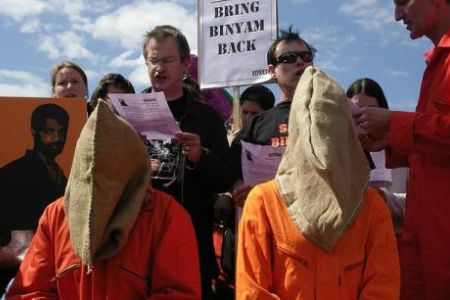Britain clears torturers by tradition

 Everyone knew that Britain will stay true to an at least one-decade-old tradition of letting torturers get away scot-free, and yes, Britain has done it.
Everyone knew that Britain will stay true to an at least one-decade-old tradition of letting torturers get away scot-free, and yes, Britain has done it.
The Crown Prosecution Service has been investigating the accusations that several MI5 and MI6 officers were complicit in the torture of prisoners, mostly in other countries.
Now media reports say Scotland Yard and the Director of Public Prosecutions are to show their commitment to the mentioned tradition through even refusing to bring charges against the accused.
Several British Muslims as well as nationals from other countries have sued the British government for MI5 and MI6 agents’ involvement in their torture in the US’s Guantanamo detention facility as well as in Pakistan, Afghanistan, Egypt, and Libya.
One of the recent cases was Sami al-Saadi who was arrested in an extraordinary rendition operation led jointly by Muammar Gaddafi regime in Libya and British spy agency MI6 and sent to Tripoli for torture.
The scale of the claims about Britain’s complicity in torture including in Iraq and Afghanistan forced the government to launch the Gibson inquiry to examine Britain’s role in torture and rendition over the past ten years.
However, victims challenged the inquiry as increditable, months after its launch, and claimants withdrew their cooperation with the investigation team one after the other complaining that it is a set-up to acquit the government.
While the inquiry was struggling with a credibility crisis, a political expert from the University of Edinburgh left no doubt back in November that no British citizen will ever stand a trial for torture, let alone being convicted.
“Despite the events of the past ten years, no British citizen has ever stood in court accused of the crime of torture. In fact, the only person ever convicted of torture in a British court is a former Afghan asylum seeker – for acts he carried out in Afghanistan,” said Tobias Kelly, who is a lecturer at the University of Edinburgh.
Kelly who is an expert on political violence said British soldiers have been convicted of “lesser” crimes such as assault or dereliction of duty, but never of torture, at least for the past 60 years.
“At times, commentators have come close to the claim that if an act is carried out by a British citizen, it cannot – almost by definition – be torture, as the British simply do not behave that way,” he added.
Last year, lawyers of 200 Iraqi civilians presented the High Court in London with “credible” evidence of their “systemic” torture and abuse by British forces.
One of the Iraqi victims, a hotel receptionist named Baha Mousa was brutally beaten to death by British officers. Mousa had suffered at least 93 injuries prior to his death at hands of officers from the 1st Battalion of the Queen’s Lancashire Regiment.
However, British officials simply cleared the soldiers of torture.
Kelly said at the time that the British government would continue to “find other words to describe the brutal ill-treatment of detainees” because “too much is at stake for the British government to admit its complicity in torture.”
That is exactly the case now as a joint announcement by the Scotland Yard and the Director of Public Prosecutions Kier Starmer rather than a statement by the latter suggests investigations into the issue could continue.
Yet the subject of the investigation would most probably be similar to what Starmer decided on the probe into the case of MI5 complicity in the torture of Binyam Mohamed.
Starmer said at the time that a “wider” investigation” would continue into “other potential criminal conduct”, not torture.







